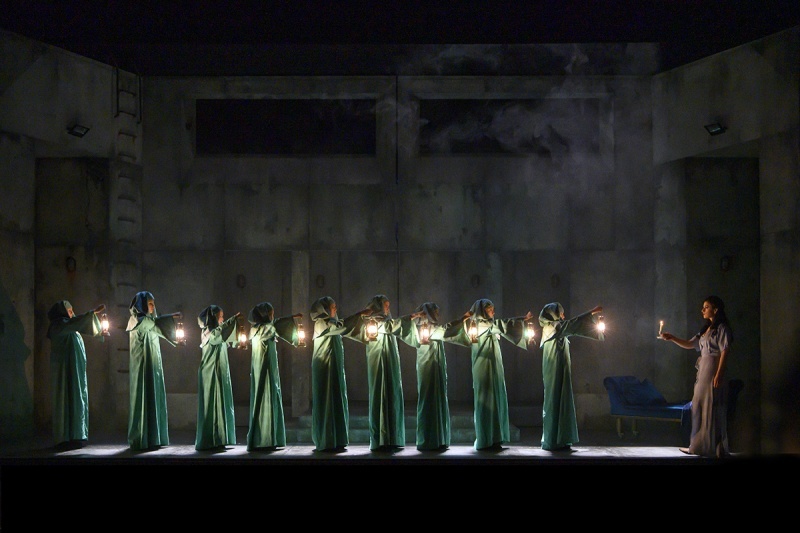
English Touring Opera are traversing the country with a menu of three pieces, one of which is Verdi’s Macbeth. A less frequently performed opera of Verdi, Macbeth never reaching the iconic status of his much later cracks at Shakespeare, Falstaff and Otello. The piece has a very different feel to those operas but ETO prove that it is a piece of many virtues that deserves to be brought to audiences more often.
A curious note in the programme asserts that Verdi’s abridged reworking of the play is of equal if not greater psychological depth to Shakespeare’s version. I am not sure I agree. Verdi’s treatment is altogether more rapid and brisk by comparison and really doesn’t afford itself the time to interrogate the bloody inclinations of the characters. The tone, themes and characterisation are writ large and write clearly in a piece that prizes narrative pace and action over solipsistic reflection in its arias. And that is not a bad thing. As much as Verdi’s Macbeth is a fairly faithful if shortened take on Shakespeare, the biggest change is that it feels like a sensation melodrama rather than a dour and violent tragedy. Posturing in the programme aside, English Touring Opera embrace this tone and excel.
The rule for assessing Macbeth is as true for the operatic version as much the stage play: Lady Macbeth is the watermark of quality. Thankfully, Madeleine Pierard sets a very high standard for the piece and comports herself equally as a naturally regal personality but also as someone plausibly broken by ambition and bloodshed. Grant Doyle portrays Macbeth as unbending, and it is clear why the once more reluctant of the two murderers is the one unbroken by despair and guilt.
The set is an example of considered and effective design. For the most part designed as an enclosed bunker, the centre uses changing doorways to create depth or compartments. This facilitates a lot of visual communication and clarity alongside the blocking and music, as characters become isolated, divided or entrapped on stage whilst integrated in larger scenes. Simple but effective. Similarly, by the second half we open out, with the rear of the stage leading to the barren trunks of Birnam Wood. Hence a lot of the drama anticipates the final confrontation and the mass of the black empty space heightens the ominous feelings.
A small rum note I do want to draw attention to is that of the selection of the props, specifically the crowns. The modernised style of Macbeth is cultivated sensibly, with the murderous couple adopting a svelte presidential air. However, for sequences that require Lord and Lady Macbeth to wear crowns, the props chosen come across as a touch ‘costume party’. Crowns are inherently gaudy and ridiculous-looking at the best of times, but it is not as though these ones are rolled out with other regalia and a matching degree of ceremonial pomp. They work fine for the more hallucinatory line-of-kings sequence, but a more restrained diadem might not puncture the tone of the other scenes as noticeably.
If it has come to interrogating individual prop selection to find points of criticism, you can assured that this is a ringing endorsement. English Touring Opera is a reliable company that I look forward to every year and Macbeth shows why their reputation is well-earned. ★★★★☆ Fenton Coulthurst 1st May 2019

